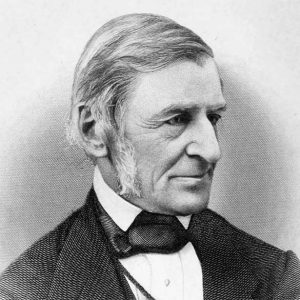Author: Bill Younglove
Ralph Waldo Emerson, like those of his Transcendental Era, believed in speaking for himself. This is evidenced by not only the number of publications during their lifetimes, but also via their anthologized epilogues. Whilst the “engine in the (Thoreau’s) garden” may have disrupted the sleep of some, other Industrial Revolutionary inventions, such as the telegraph, post office, and newspaper (not to mention, later on, the transatlantic cable) added to the wide spread of ideas. In other words, humankind living in the 1800s—and afterward—stood to benefit greatly by and from such creations.
Would, however, Emerson and his peers have benefitted if the likes of Artificial Intelligence had invaded Concord? They obviously gained greatly from the invention of the printing press itself, but would such as the creation of the internet—and beyond—have been seen as an innovative plus—or minus, or both? As I type this short article, and plan to send it out electronically, I would have to consider my computer’s internet access a definite positive, saving me considerable time, not to mention stamps! If, however, the Transcendentalists had risked having their original ideas usurped, or modified, by a printing press, beyond their control, would they not have railed against such practices? Emerson managed to travel abroad, benefitting greatly from many forms of transportation, even though he quipped that “Travelling [sic] is a fool’s paradise.” At least he arrived, thrived, and returned safely.
Guardrails may not have been needed back in the days of horse and buggy, but road improvements changed all that. By the same token, the Brook Farm and Fruitlands would-be utopias failed because of a fire and smallpox; food shortages and harsh winters, respectively. While the nineteenth-century citizens, thus, had to combat medical and weather-related facts of life, they still exercised a great deal of control over their own destiny. Emerson and Thoreau remained free to experiment—and extended that freedom, to the extent possible, to those still enslaved at that time.
Immanuel Kant’s doctrine of transcendental idealism emphasized a distinction between what we can experience and what we cannot. Such a distinction led Emerson and Thoreau to look to nature as a catalyst for their own theories. It was individuals’ very human imaginations that united them and nature. Living an everyday life meant not surrendering such to anyone else—or thing. By its very designation, Artificial Intelligence is non-human—and, whether, by accident or by the design of others, it can be used to usurp what makes humans most human—choice and originality. Self-reliance also meant being responsible to society. If Artificial Intelligence come to mean transcending the normal or physical level of human ability, then the originality, creativity, and natural intelligence that the Transcendentalists espoused may very well be doomed.
